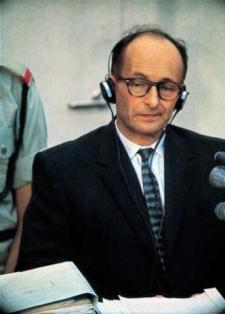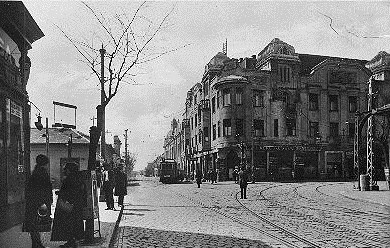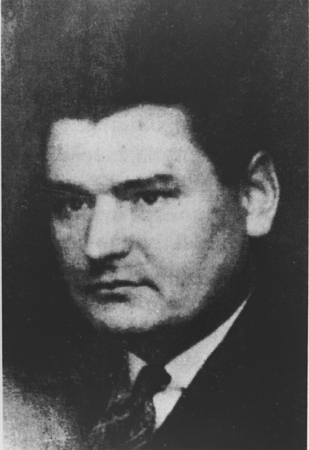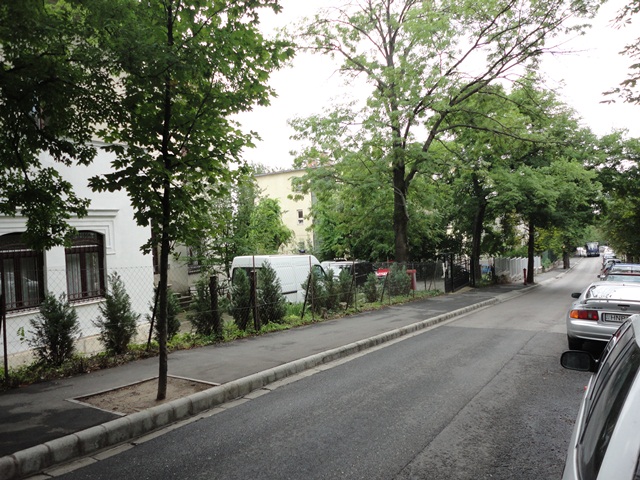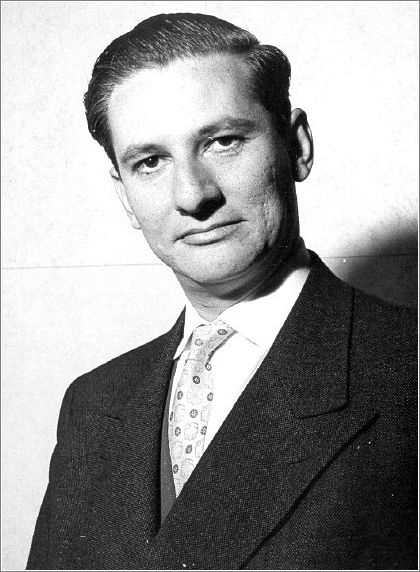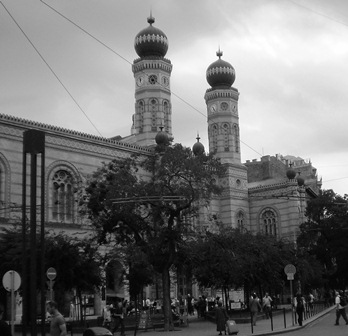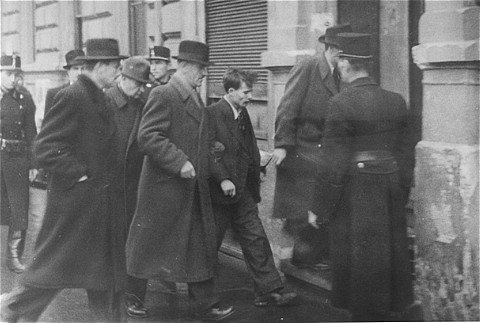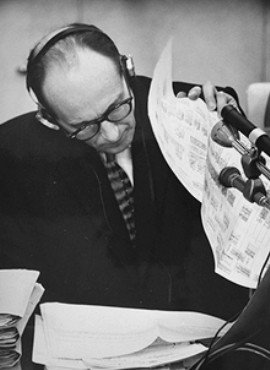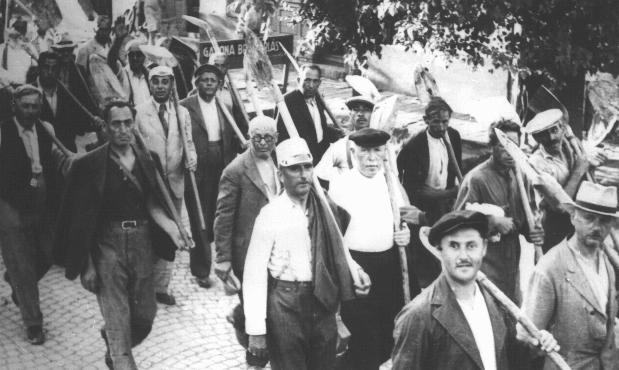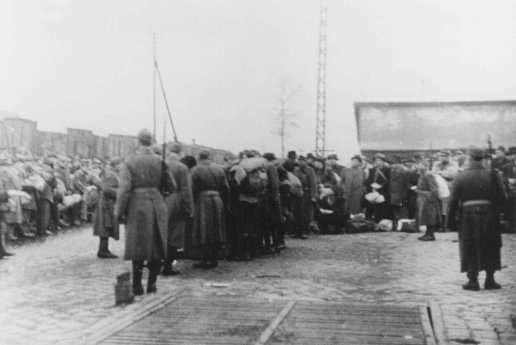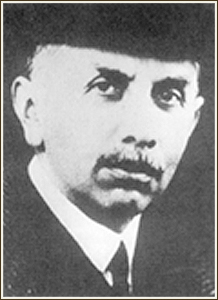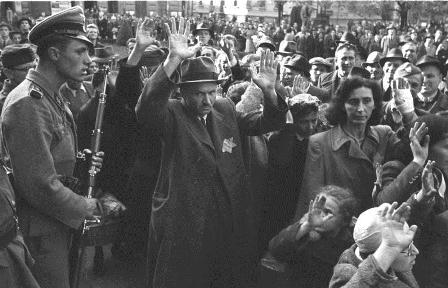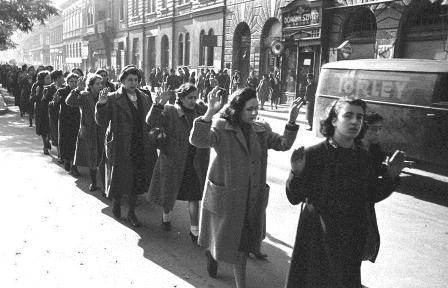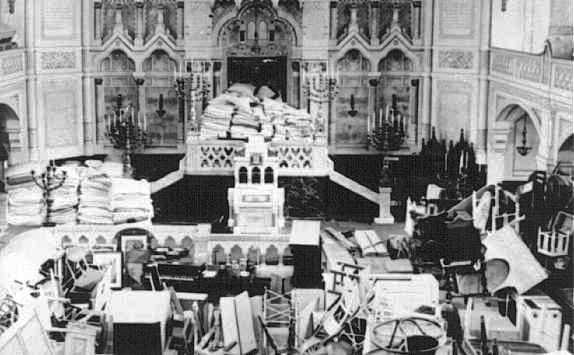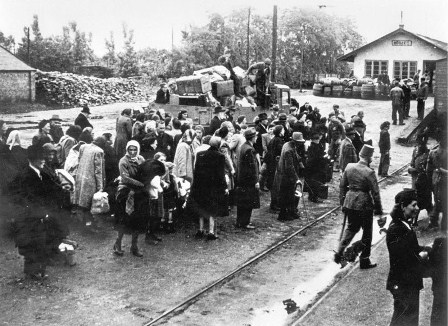Holocaust Education & Archive Research Team |
Trials Introduction to the Holocaust Trials
Trials
Interrogations & Testimonies
The IMT Series Nazi Justice | |||||||||||||||||||
Adolf Eichmann in Budapest Avraham Gordon Eichmann Trial - Session 54 Jerusalem 26 May 1961
State Attorney Bach: Your Honours, our next witness is Avraham Gordon.
Presiding Judge: Do you speak Hebrew? Witness Gordon: Yes, I speak Hebrew. [The witness is sworn.] Presiding Judge: What is your full name? Witness: Avraham Gordon. Presiding Judge: Please reply to Mr. Bach's questions. State Attorney Bach: Mr. Gordon, were you born in Hungary? Witness Gordon: Yes. Q. In Budapest? A. Yes. Q. In what year? A. In 1927. Q. Where were you in 1944? A. I was in Budapest. I was at school in the sixth grade of the Gymnasium ( Secondary School) - this corresponds to the tenth grade in Israeli terms. Q. Do you remember 19 March 1944? A. It was a Sunday, the day on which the German army occupied Hungary and also entered Budapest. Q. How did this affect your studies? A. In the following two weeks our studies went on, and thereafter, a general closure of all the schools in Hungary was declared. We finished the school year and after that classes were stopped and also the air-raids began. This was the reason given for ceasing all teaching in Hungary that year. Q. Did the studies of all pupils cease? A. Of all. Q. Not only of the Jewish pupils? A. No - all of them. Q. Were you living with your family?
A. Yes. I was staying in the district of Buda, Quarter No. 1. Q. Who were the members of your family? A. My father, my mother, my brother, my grandfather and grandmother. Q. When were the Jews ordered to wear the yellow Shield of David? A. As far as I remember, it was on 5 April. This is the date I recall. Q. Do you remember receiving, on one of those days, a certain order from the German authorities? A. That was about a week before Hitler's birthday, on 12 or 13 April. I think that this order came from the Jewish Council, with the approval, and by order, of the German security services. Q. What was the order? A. It was stated in the order that we were to report on the Schwabenberg in the morning for labour service. Q. What was the Schwabenberg? A. Before the War Schwabenberg served as a resort place, and it had many private villas. When I arrived, I found most of the headquarters of the German army there. Q. You say there were private villas there? A. There were private villas, and hotels. Q. Were there also Germans in the occupying army? A. Yes. There were many German soldiers. Q. And did you report for labour service? A. I reported, and I was referred to a Jewish engineer named Kolbach. Q. Only you, or were there other Jews as well? A. When I came to the Schwabenberg, I found between one hundred and one hundred and fifty other Jews. Q. Were they all about your age, or were there also people of other ages? A. Most of them were young people under the age of 18, but there were approximately 20-30 older persons, about the age of 50. Q. Please tell the Court what happened after you reported to Mr. Kolbach? A. They detailed us to various types of work. They were drilling two tunnels there, one in the direction of the Eden Hotel which was opposite the Majestic Hotel and the other leading to the Majestic Hotel. We did not know exactly the uses to which these tunnels were to be put. We thought they would serve as shelters and as arms depots. Q. Arms depots and shelters for whom? A. For the German army. Q. You say that you reported to Kolbach. Was he in charge of this work?
Q. How long were you engaged in this work? A. I was engaged in this work for approximately one month. Q. When was this, roughly? From when to when? A. It was in 1944, from the middle of April to the middle of May 1944. Q. And throughout this time, you worked at the same place? A. They also sent us to so-called outside jobs. We worked both at the Eden Hotel and also at the sanatorium, and once or twice I was also sent to work in the building of the Hungarian Political Police. The building of the Hungarian Political Police was near the Majestic Hotel. Q. Mr. Gordon, did you see Adolf Eichmann at the time you were working there? A. No. during the time I worked on the Schwabenberg, I did not see Adolf Eichmann. Q. Did you see Adolf Eichmann at all while you were working in that service? A. Yes. Q. When? A. After the middle of May 1944, we received an order; we were classified - they sorted out about fifteen Jews - about ten young people and five adults - and we were transferred to a particular place, which was called the "Rose Hill" in one of the districts of Buda, and we were taken to a villa, which as it turned out afterwards, was the private residence of Adolf Eichmann. Previously, before the War, this villa belonged to a Jewish industrialist, the owner of the Tungsram and Orion factories. Q. What was his name? A. Leopold Aschner. Q. Was Leopold Aschner the Jew to whom the villa belonged? A. Yes. He was the legal owner of the villa. Q. And that was where Eichmann lived? A. Yes. Q. What were you supposed to do in this district? A. First of all, a German awaited us - he was dressed in short trousers, a man by the name of Slawik, and he showed us a small storeroom for work tools at the rear entrance of this building, and he gave us tools, and we went out into the garden of the building. It was a large garden, and he ordered us to dig ditches. Q. When you say "us" - how many were you? A. There were fifteen of us. Q. Were these the same fifteen? A. The same fifteen. Q. Do you know who this Slawik was - what was his rank and his duties? A. We did not know exactly what his duties were, but we thought he was Eichmann's bodyguard.
Q. Did he sometimes walk around in uniform, or was he always dressed in the way you have described? A. I only saw him wearing civilian clothes. Q. How did you know his name was Slawik? Q. He introduced himself, saying that his name was Slawik and that "you had better beware of me." Q. And he made you dig these ditches? A. It was in this garden, a very large garden, and we were forced to dig about twenty ditches in that garden. Q. How long did you work there? A. I worked at that place for about a month, until the middle of June. Q. Every day? A. Yes. Q. And all the time with the rest of your companions? A. No. Although the group did not change, in the middle of this period, when the deportations began from the suburbs of Budapest, from Ujpest, Kispest and so on, there were also some Jews from these localities who came to work. And in the middle of this period they suddenly stopped coming. And then we understood that they had been deported. Q. You told us about Slawik. How did you know that this villa served as a residence for Adolf Eichmann? A. First of all, the engineer in charge of us told us that one of the Gestapo commanders from Budapest, whose name was Adolf Eichmann, lived there, and Slawik also mentioned his name. Q. Did you also see Eichmann? A. I saw him a number of times. Q. You see the Accused here. Are you able to say with certainty that he is the man? A. I must point out that he has changed since then. But I have seen old pictures of him. Presiding Judge: Where did you see his pictures? Witness Gordon: In the press. State Attorney Bach: Mr. Gordon, look at these photographs. Are you able to say anything about them? Witness Gordon: This is the man - without a shadow of a doubt. Q. There are three photographs here, Mr. Gordon. To which photograph are you referring? A. To the right-hand photograph, mainly, at the top. State Attorney Bach: I would apply to submit this document to the Court. The Court will notice that this exhibit is actually signed on the reverse side by the Accused. Presiding Judge: Has it been showed to the Accused? State Attorney Bach: Yes. And he has acknowledged it. Presiding Judge: Did he acknowledge it in his statement? State Attorney Bach: I believe that these photographs, each one separately, were shown to him. But I shall check this matter once more. If it should be necessary, we will submit additional proof on the question of this signature. Presiding Judge: This document will be marked T/1125. State Attorney Bach: When you saw Eichmann, how was he dressed? Witness Gordon: He used to walk around inside the villa. I saw him first on the veranda, on the balcony of the second floor of the villa - what in European terms is called the first floor.
Q. How many floors were there in the villa altogether? A. I would say one floor, but in Israel this would be referred two as two floors. There was a ground floor and another floor. Q. And where did he reside? A. He resided on the upper floor. Q. And where did you see him? A. I saw him for the first time when he was sitting on the balcony and drinking, sipping drinks. I saw him a second time during a bombing, an air raid. On that occasion he was walking around, strolling in his garden, and we were carrying on with our work on the trenches. He started shouting at us to get into the trenches. And Slawik came after him. Q. Did he himself also get into a trench? A. No, he did not get into a trench. Q. What did Slawik do? A. Slawik stood next to him. Q. How many times, in all, did you see Eichmann? A. I the next time I saw him was when I was working in one of the trenches and I suddenly heard shouts. I saw Eichmann's chauffeur, who was a young man. Q. What was his name? A. I remember his name as Teitel. I saw and heard this soldier approaching one of the Jewish boys working with us. I knew him by the name of Salomon. Q. Was that his surname or his first name? A. I don't know. We knew him by that name. Q. When you say "boy" - how old was he? A. He was our age, 16 years old, 17 at most. Q. Tell us in your own words what happened. A. I saw how this soldier, Teitel, went up to this boy and shouted at him. I saw how Slawik also appeared suddenly, clad in his short trousers, as I remember it, and half- naked. Q. What do you mean by "half-naked"? A. Without a shirt or vest. Q. That means that the upper half of his body was completely exposed? A. Yes. A. They were shouting something like: "You have stolen cherries from the tree!" (as if it were so in fact). Eichmann was standing on the upper floor balcony. Apparently some conversation between then had taken place. Presiding Judge: Between whom? Witness Gordon: Between Slawik and Eichmann above. State Attorney Bach: Before you refer to that conversation - where was this Salomon boy working at that time? Witness Gordon: I was working on the trench in the centre, and it seems to me that he was working on the trench to my right - a distance of 10-15 metres from me. Q. Were there trees there, cherry trees? A. I don't remember whether there were cherry trees in that garden. But close to this villa there was an orchard of fruit trees, and this orchard also formerly belonged to the owner of the villa, Aschner.
Q. Tell me further: When Slawik and Teitel shouted at Salomon, how did the boy react? A. He began shouting: "I didn't do it, I am innocent." After that I saw how Slawik and Teitel were leading the boy, holding him... Q. Before you come to that - you said there was a conversation between them and Eichmann who was standing on the balcony. Did you hear what they were saying? A. I heard Teitel say that the boy had stolen fruit, cherries - had stolen them from the trees. Apparently he asked what should be done with him. This I could no longer follow. That apparently is my conclusion. Q. Did you hear the reply? A. I did not hear the reply. Q. What was the next thing you saw? A. I saw how the boy was taken by Slawik and Teitel towards the tool shed , the shed from which we used to take out work tools for our work. I saw how they shut the lad in, pushed him. They were leading him on against his will. They forced him into the shed and locked him in there. After that I saw that the chauffeur went away. I did not notice where he was after that. I noticed Slawik returning, going round the building, suddenly he disappeared from my view. Afterwards I saw that he returned with Eichmann, and the two of them entered the tool shed. Q. Now please explain something to me: You said that he returned with Eichmann; from what direction did they come - Eichmann and Slawik? A. They came round the building. Q. Was it not possible to reach the tool shed from inside the house? Did they have to leave the building? A. This tool shed, which I have referred to, was to the rear of the building, and there was only one entrance - from the road. In order to get to the shed, they had to go right round the house. Q. Mr. Gordon, would you kindly make a sketch of the building, showing where the front was, and where was the rear, where was the balcony you mentioned, where was the tool shed, and where were you standing when you saw all those things happen. I think this will make it clearer to the Court. It doesn't have to be exactly to scale - we require to see the various directions so that we may understand your story. Your Honour, the exhibit, which was previously submitted by me, has already been marked T/37(7). Witness Gordon: [Shows the sketch he has drawn]. State Attorney Bach: Perhaps you would explain what you were doing, and whenever you come to a particular place, mark it with a letter, so that the Court may know what you are referring to. Witness Gordon: [Pointing to the sketch he has made] The entrance to this building was on Apostol Street - that was the name of the street where Eichmann lived. I don't remember the exact number, but I think it was No. 13. Here is the entrance to the front garden - the building begins here - this is the front of the house, the main entrance. In order to reach the place where we were working, we had to pass on this side and to go in through the back entrance. This is the entrance to a small cellar - it was not really a cellar. We had to go down a few steps. On the right hand side there was a door, and that is where the tool shed was. This is the garden of the villa. This lay in the direction of the Danube. It was a very large garden. I don't think that there are gardens of this kind in Israel. Our task was to prepare some rows of trenches. I have not sketched in all the trenches. Here, roughly, is the set of trenches, the place I am speaking of is this entrance here. One had to go down two or three steps. The corridor is narrow and the entrance on this side - that is the place I am talking about. Here is the tool shed. Q. Would you please mark this with the letter "A"? A. I have marked the place with the letter "M." Q. Where is the corridor you are talking about? A. This part here. Presiding Judge: And what is that on the side? Witness Gordon: This is also a balcony, on the side of the building, its side facade. There were also balconies on the front side, but I do not remember them.
State Attorney Bach: Would you please mark, with an "A," the balcony where you saw the Accused? Witness Gordon: [Does so]. Q. Were these orchards in the direction of the Danube? A. Both the building and the orchard led towards the Danube. It was a slope, a decline in the direction of the Danube. This is the orchard. The building and the fruit orchard did not have a common fence. In order to get to the orchard, one had to pass along a narrow path. Presiding Judge: Please explain why it was necessary to go around this shed? Witness Gordon: This shed ended against a wall. There was no entrance at all from the front side. To get to the shed one had to go right around for there was no entrance from the back. Q. From which orchard did they say that this boy stole fruit? Was it from the orchard to the side or from another one? A. We did not believe for a moment that this boy stole the cherries. Q. I am saying that they said that he had stolen. From which orchard? A. I don't know, I don't remember. State Attorney Bach: By the way, were all the fifteen young men working there all Jewish? Witness Gordon: Yes. Q. Including this Salomon? A. Yes. Presiding Judge: I have marked the sketch T/1153. State Attorney Bach: Do you know anything at all about this boy, where he came from? Witness Gordon: We knew about him. He didn't tell us, but it was said that he had escaped from the zone of Carpatho- Russia, the region of Munkacs. He fled to Budapest and was accepted for work on the Schwabenberg. Q. You told us that you saw Eichmann and Slawik coming together towards the shed. How was the Accused dressed? A. He wore long trousers and a light-coloured shirt. He was not in uniform. Perhaps the trousers were part of a uniform, but I cannot say this with any certainty. Q. What kind of shirt was it? A. A light-coloured shirt - that I remember. Q. Would you kindly tell the Court what happened after that? A. The boy was locked up in the shed. I saw the two of them going into the tool shed. Q. Where, precisely, were you standing when you saw it? A. On the sketch I have shown a trench opposite the back entrance. I was working in this trench. Q. What distance was that trench from the door of the shed? A. Ten to twelve metres. Presiding Judge: Would you, perhaps, show us to what trench you are referring, and mark it, let us say with the Hebrew letter "Bet." Witness Gordon: I have already marked it, in error, with the Roman letter "B." Q. These circles, are they the trenches? What were the trenches for?
A. At that time we did not know why we were digging these trenches but, later on, it became clear to us that these were apparently positions for mortars. I am not absolutely sure of this - that was the conclusion we reached later. Q. What was roughly the size of the trench? A. I think 150 centimetres deep and about 160-180 centimetres wide. At any rate we were able to stretch out our arms inside the trench. State Attorney Bach: Now tell us, in your own words, what happened afterwards, exactly as you saw and heard it. Witness Gordon: I was standing in the trench and I saw Slawik and Eichmann open the door and go in. Q. Who was with you in the same trench? A. There was a Jewish boy, whose name - I am not sure that I remember this correctly - was Bruck. I think that was his name. Presiding Judge: Are you sure, or not sure? Witness Gordon: I am not sure of this. We worked there in all kinds of pairs. Generally I used to work with this boy and I presume that, on that day as well, I was working with him. State Attorney Bach: Were there other young men together with you or near you who were also able to see and hear what was going on there? Witness Gordon: Yes, it was nearby, they could hear what was going on there, and from some of the trenches they could also see. Q. But you were together with one other young man in your trench? A. Yes. I saw Eichmann and Slawik entering the tool shed. The door closed. After that I heard terrible screams, beatings, blows and crying. Q. Did you identify the screams? A. Yes - it was the voice of the boy who had been taken, and whom we knew by the name of Salomon. These screams lasted about 10-15 minutes - I didn't measure the time, but I assume that it was so. Suddenly there was silence. And after I didn't hear the shouting any more, the door opened and Eichmann came out. I saw him, his clothing was dishevelled, he looked wild, his shirt was sticking out - I noticed stains on his shirt and I thought that these were bloodstains. I didn't only think so, I knew, almost for certain that these were bloodstains. Q. Were these stains also on his shirt when he went in? A. No. He went away quickly, and at the moment he passed by us he muttered words which I heard quite clearly. He said: "Uebriges Mistvolk." I have remembered these words for seventeen years. Presiding Judge: How would you translate that? You know Hebrew quite well. Witness Gordon: I would translate it "Superfluous dirty people, superfluous garbage people." State Attorney Bach: Do you know German? Witness Gordon: I understand some German. Q. Are you fluent in the German language? A. No, I can read a little German. I understand it fairly well. Presiding Judge: Did you learn German at school? Witness Gordon: At the age of 17 I knew German far better than I do now.
A. Eight grades - during the whole period of the Gymnasium. Those were the words which I remember - I didn't want to change them. State Attorney Bach: You said that he looked wild, and you told us about his shirt. What can you tell us in general, what did you notice in his external appearance that was different from his earlier appearance? Witness Gordon: I came to the conclusion that he had taken an active part in beating the boy. Q. Was that the conclusion you came to? A. Yes. Q. On the basis of what facts did you reach these conclusions? A. First of all, there could have been only two persons there. Q. What did you notice about him that led you to draw these conclusions? Presiding Judge: He has already described his appearance. State Attorney Bach: Tell us simply everything that you saw. Witness Gordon: When he went inside, he was dressed meticulously. When he came out, his shirt was hanging out, and his clothing was disarranged. I would say that he was tired - he was breathing deeply. That's it. Q. Those stains that you saw - how big were they? A. I don't remember. Q. Approximately? A. I can't remember that. Q. On what side of the shirt did you see these stains, on the front portion or on the rear? A. On the front, at any rate. Q. After he went out, in what direction did he go? A. He went the same way as he had come. Q. Did you also see Slawik? A. Yes. I saw Slawik afterwards. Q. Please continue with your account. A. A few minutes after Eichmann came out and left the place, Slawik came out. I saw that he was looking for his driver. Q. For Teitel? A. Yes. And he also shouted for him. Later on I saw Teitel appear, but I did not notice from what direction. They went into the shed and they dragged the boy's body outside. I saw how they were holding him by the legs and dragging him. The boy was lifeless. Q. Did you see any signs of life in the boy? A. No. Q. Perhaps you would describe what you saw on the boy? A. It was no longer a human form. I could see his eyes, the face was swollen, it was completely covered with blood. It is difficult for me to describe it exactly. He was torn, rent apart; they dragged him away and put him down in front of the back entrance. After that the driver went away, and brought back a kind of car-boat - the kind used by the German army. Presiding Judge: An amphibious car?
Witness Gordon: Yes, it was a car that was equipped for riding both on water and on land. State Attorney Bach: Was this a car that belonged to Eichmann? Witness Gordon: I assume so. Q. It was at his disposal? A. Yes. It was a car which we saw every day. Apart from that, there was also a black private car in front of the building. Q. You saw this car every day at this villa? A. I can't say exactly - but I think so. Q. What happened then? A. After the car arrived I saw how the body of this boy was placed in the back seat. As it looked to us, it appeared that they placed the body under the back seat. Then the chauffeur drove off and returned about half an hour later and ordered us to carry on working. He came up to us - we were then in a larger group, working together. I don't remember what we were actually doing at the time, but he came up to us and spoke to us, expressly in Hungarian. He was a Swabian who knew Hungarian. Presiding Judge: From Transylvania? Witness Gordon: No. The Swabians lived in an area near the Austrian frontier. This was a Hungarian sect, speaking German. Judge Halevi: Are you speaking about Slawik? Witness Gordon: I am speaking of Teitel. He said to us: "I threw the carcass into the Danube. You will all suffer the same fate as that boy." State Attorney Bach: This Teitel - where was he when Eichmann and Slawik were inside the shed? Witness Gordon: I didn't understand the question. Q. Where was this Teitel when Eichmann and Slawik were inside the shed together with Salomon? A. After they had brought the boy inside the shed, he went away. I didn't keep track of him - I don't know where he went to. Q. Did he only come back subsequently when Slawik called him? A. Yes. We were then far too shocked and did not notice exactly what was happening. Q. Apart from Eichmann and Slawik were there any others who went into that shed, together with Salomon? A. No. Q. Did this Slawik talk to you again, afterwards, about this occurrence? A. No. Q. But you continued working with him? A. Yes, we continued working with him. Q. Subsequently, did you ever see Salomon again? A. No. Q. Did you subsequently see your other comrades who worked with you on that day? A. Yes, I saw one of them, the one who worked with me, called Bruck, in 1945, in Budapest. He survived, but later on I met him once in the street and we spoke about this incident. Q. I am referring specifically to the days following this incident. Did you continue working in the same place? A. Yes. Q. Did the others continue showing up at work? A. Yes.
A. I can't tell you exactly, for two other incidents also occurred at the same building. Q. Please tell the Court about the two later incidents which you witnessed. A. After one of the three incidents - I shall refer to the other two later - after one of the incidents, we ceased working at that building. I don't remember after which of the incidents it was that we finished working at that place. Q. Which of the other two incidents? A. Yes. Q. You don't remember the chronological order? A. No, I don't remember the chronological order. Q. Nevertheless, please describe these two incidents. A. One evening we were about to go home. We came to work every day. It was almost dark. Q. When you say "we came to work every day," how were you able to travel to your place of work? A. We were provided with passes which we received from the SD or the SS. I don't remember. I think these passes we received from the SD, and this pass forbade the Hungarian authorities to touch us, to take us to other work. Q. Please continue. A. The person in charge of all these operations, whom I mentioned - his name was Engineer Kolbach - came that evening to supervise the work. Before we left the building an SS soldier came to Engineer Kolbach and called to him to go inside the building. He said that Eichmann was calling him. While this was happening we saw Eichmann standing outside, not on the balcony I mentioned earlier, but on the side balcony. After Kolbach entered the building, Eichmann disappeared from the balcony. We stood there for a moment, waiting. We were not permitted, at that moment, to leave the place. We heard how a quarrel broke out upstairs, we heard shouts, and we heard what seemed to be slaps on the face. After several minutes we saw that same SS soldier, who had called Kolbach, accompanying Kolbach and putting him into a car. To me it seemed to be the same amphibious car - and he drove away in it. A brother-in-law of Kolbach, also an engineer, whose name was Hegedus, was working with us. He was very frightened, and understood immediately that they were taking his brother-in-law, Kolbach, up to the Schwabenberg, to the Majestic Hotel. We waited for a further half hour and then we were allowed to go home. Hegedus came to me, since I lived in the same quarter of Buda and could speak German, and asked me to go up with someone to the Schwabenberg, to the Eden Hotel, in order to speak to Buehring. Buehring was the liaison officer between the Jews and the Germans. He asked me to find out from Buehring what had happened to Kolbach. When I think of it, it was somewhat of a crazy thing to do to go there, but despite that we went. Q. But you did so? A. Yes, I did it. I knew that Buehring resided at the Eden Hotel which was opposite the Majestic Hotel. Presiding Judge: Did you go there alone, or with Hegedus? Witness Gordon: No, I went there with another boy who also lived in Buda. We went to the Eden Hotel. Between the Eden Hotel and the Majestic Hotel there was a small bridge, and on it stood a sentry. We went up to the sentry and asked him to call Mr. Buehring. He had the rank, it seemed to me, of Oberscharfuehrer - something like that - a sergeant.
Buehring came out, they called him. I told him about Engineer Hegedus whom he knew, and he also knew Kolbach, and we said that we thought Kolbach had been taken in error and was now already at the Majestic Hotel. This Buehring generally behaved towards us in a very decent and honest manner, he never shouted, and he treated us in a humane way. He promised to find out about this. We went home, it was very late, and we never saw Kolbach again. I, at any rate, never saw him again. State Attorney Bach: Did Buehring or anyone else inform you definitely of his fate? Witness Gordon: No. Q. This was the second incident you spoke about. Now tell the Court about the third case. A. The third incident also occurred in the course of the morning. Q. Where did it take place? A. I remember this incident, and I can also remember the approximate date. I am positive that, on this occasion, the Jews who used to come from the suburbs of Budapest were already no longer there. By that time we were eight to ten persons, no more. Q. Of your Jewish comrades? A. Of the fifteen of us who were taken from the suburbs of Budapest. Q. There were then only eight or nine of them? A. Yes. Q. What was the reason that the others no longer came? A. We knew that the Jews of the environs of Budapest had been deported. Q. That is to say, there were still eight or nine of you working there? A. I think it was about ten - up to ten, no more. Q. And so? A. That morning Slawik appeared with a Hungarian woman; he led her by the arm. This woman was apparently the wife of the gardener or of the man in charge of the house. We were given an order to line up inside this tool shed. Then Slawik began shouting at us that this Hungarian woman had a daughter 8 or 9 years old, and that one of the Jews had tried to rape this girl. He asked us who had done it. In the middle of this shouting Eichmann came inside and, without enquiring what was happening there, began slapping several of us in the face. Amongst the others I, too, was privileged to receive a slap from him. Q. Did he walk from one to the other and give each one a single slap in the face? In what way was this done? A. I did not pay attention. I was dazed from the slap. Q. Was it a strong, heavy slap? A. I think it was fairly strong. After that, this woman - in the middle of the shouting - began crying. I understood that she was arguing that it was not true, it was a false charge. Suddenly we were told to leave the place. Presiding Judge: I do not understand this now. Did the gardener's wife begin to say that this was a false charge? Witness Gordon: Yes. Q. And who spread the libel - do you know that? A. I think it was Slawik - I think it was Slawik's doing. We believed that we could thank this woman for the fact that we came out of this place without harm. I think it was after this incident that we went back to work on the Schwabenberg. State Attorney Bach: How was Eichmann dressed during this third incident which you have just described?
Witness Gordon: I didn't manage to see what he was wearing during this incident, but he generally went around in long trousers and a shirt. I never saw him with a jacket. Q. Did you occasionally see people who visited Eichmann in this villa? A. Yes. On one of the occasions a large car with a diplomatic number - C.D. - arrived. Our engineer said that this was the Ambassador Veesenmayer. Q. Did you see this man on that occasion? A. Yes. I saw him but only from the side - I didn't see his face. Q. Mr. Gordon, after that incident occurred, the one which you previously described concerning Salomon, did you also talk about it to other persons? A. First of all I spoke about it to my family, after I returned home. At the beginning I was reluctant to tell my parents for I did not want them to be unduly worried. But I told my brother who was also working on the Schwabenberg but who had not come to work on Apostol Street. Q. How long after the event did you tell your brother? A. On the same day. Q. Where is your brother today? A. In Kibbutz Kfar Hahoresh. State Attorney Bach: Thank you very much. Dr. Servatius: I have a number of questions. Witness, you have just said that you informed your brother immediately, on the next day. Presiding Judge: Did you say the next day, or the same day? Witness Gordon: I think it was the same day. Q. I want to know what you said before? A. Before I said: "On the same day" but I did not attach much significance to that. I told him on the same day. Dr. Servatius: Did you say it was on the same day or the next day that you told your brother? Presiding Judge: He says that when he was questioned by Mr. Bach he said it was the same day, and now he also thinks it was the same day. Dr. Servatius: You made a statement, which I have in front of me, although I cannot see the date that is indicated here. It fits, more or less, the evidence you have given here. But they asked you questions there, and in reply to one of the questions you said: "I told my brother about this incident with Salomon a year afterwards." State Attorney Bach: Perhaps I may explain? Presiding Judge: Mr. Bach, perhaps we shall first let the witness explain. Witness Gordon: I made this statement to the Police at Eilat. There was a policeman there who was very far removed from all these events, and I was obliged to explain to him, not only my evidence, but the whole background. I became tired from this, and when he read back my statement to me I apparently did not pay attention to what he had written. And later on I corrected this again, in Bureau 06. Possibly this amounted to negligence on my part for not paying attention to it. State Attorney Bach: I think perhaps there is an error here. Defence Counsel was misled through no fault of his. It is really written here "Shana" (a year) and this has been translated into "Jahr." But I believe that there is a printer's error here. I have requested that the original manuscript be brought here and I will then place it at the Court's disposal. Presiding Judge: The witness can tell us. Did you see this statement that you made at the time in Eilat? Witness Gordon: I made my statement and I saw it, but it is possible that owing to my weariness I didn't pay attention to the last sentence. Presiding Judge: Mr. Bach will submit the original statement when he will obtain it. Dr. Servatius: Witness, you said that this boy, of whom you said that he was beaten and according to your assumption he was dead, was taken to an amphibious vehicle and removed from the place. Is that correct? Witness Gordon: Yes. I said that he was taken away in an amphibious car-boat.
Q. What did this amphibious vehicle look like? Was it larger than a normal car or smaller? A. I would say that it was a little longer than a modern jeep and there is a propeller on the rear end of the car. This car was painted in camouflage colours. Q. Is it easy to put a man into an amphibious car such as this one, when he is dead? A. I don't know whether or not it is easy to put a man into such a car; the fact is that they put him into it.
Q. At the time of this occurrence, were other young men of the same age present? A. Yes. Q. How did all of them, together, react to this incident? A. It is difficult for me to speak in the name of others. I can only tell you of my personal feeling. And if the feeling of the others was the same as mine, well - we were all terrified, we experienced a sense of shame and helplessness. Q. Did you know of the existence of a Jewish Council in Budapest? A. Yes - this fact was known to us. Q. Did you inform them of what you had seen? A. We informed the engineer who was in charge of us - we thought that he ought to deal with this matter. Q. Was this the only experience of bloodshed which you had in Hungary, or did you witness other events of the same kind? A. No, sir, this was the first murder I had seen in my life and that is a fact which I remember so well. After that I witnessed many murders, especially in the last three months. Q. This sketch that you drew earlier - how many times had you done that previously? A. I was asked to do so once when I was being interrogated, but then I did not draw a detailed sketch; I merely indicated on what side the entrance was from the direction of the street, and on what side there was the fruit orchard...no...I also pointed out the entrance to the shed, I remember that now. Q. In this sketch you drew various pits that you dug and you said that these were intended for mortar positions. Did I understand you correctly? A. I said that at the time we dug the trenches we did not know the purpose for which we were making them; afterwards we drew our conclusions. After I had seen other trenches of this kind, I gathered that these trenches, too, were intended for mortar positions. Q. You said that Eichmann passed by and said: "Superfluous dirty people" and in this way he expressed his contempt. But how do you explain the fact that he told you to jump into the trenches when an air-raid attack was in progress? A. I don't remember the exact words by which he told us to go into the trenches. Presiding Judge: The intention was to show you that he was concerned for your safety, and that he wanted you to enter the trenches when the air attack began. Witness Gordon: When the bombing began, we apparently expressed our joy every time we saw the American and British bombers, we rejoiced because this was bringing the end of the war closer, and possibly someone even expressed this openly and in a loud voice. That was the reason - to deprive us of the joy of seeing the oil burning in Budapest. This apparently was the reason why he told us to get into the trenches, and not because he was concerned for our safety. Dr. Servatius: Would it not have been more logical or more correct, in view of Eichmann's character as you described it just now, for him to have said: "Come here, I will deal with you now, and give you special treatment for expressing your joy at the air-raid" and not for him to tell you to get into the trenches? Witness Gordon: I must point out that I have not made a psychological research into the character of Eichmann, and I do not know what is appropriate to his character and what is not appropriate; I simply indicated facts as I saw and heard them. Dr. Servatius: I do not have any more questions to the witness. State Attorney Bach: First of all I wanted to tell the Court that I have here the original statement. It looks more like "Shana" (year) than "Sha'a" (hour).
Presiding Judge: Would you please submit the statement? State Attorney Bach: I agree that the statement should be submitted to the Court - perhaps as a defence exhibit. I am also prepared to submit it on my part. Presiding Judge: First of all, Dr. Servatius, are you ready to submit this statement so that we see what is written there - "year" or "day"? Dr. Servatius: I think it is of importance. Presiding Judge: Is this statement made at the Eilat police station? State Attorney Bach: Yes, on 15 June 1960. Presiding Judge: This will be exhibit N/1. I understand this is the place: "Then, when I saw him, it seemed to me that he was 40 years of age or older than that. I was 17. I described the incident of Salomon to my brother Aaron a year after the event. Aaron is now in Kibbutz Kfar Hahoresh." State Attorney Bach: Mr. Gordon, were you living with your brother in Budapest? Witness Gordon: Yes. Q. In order to clarify the matter, perhaps try to remember and to tell the Court, once more, what really happened and when you told him. A. After I returned from work that day, I told him and I said that perhaps we should not talk about it in the presence of our parents, but ultimately we could not restrain ourselves and, notwithstanding, told our parents as well. Q. You told them, or did he? A. I told them, and he also made some remarks about it. Judge Raveh: I should like to understand something about your sketch. Perhaps you would take the sketch. There you drew two rectangles – one inside the other. Witness Gordon: Yes. Q. What does the inner rectangle show? A. The inner rectangle depicts the villa, the building. Q. The outline of the villa? A. Yes. Q. I understand. Perhaps you would write alongside it "house" or "villa" so that we may know. These were the walls of the house? A. Yes. Q. The other rectangle - what was that? A. The other rectangle is the garden surrounding the building. Q. What are these lines? A. These are fences. Q. Perhaps you would write that down.
A. But, according to the actual dimensions, this area was much larger. Q. But, first of all, write down that this is the fence, so that we may know what it is. Was there a fence around it? A. Yes. Q. What kind of fence? A. I don't remember what the fence looked like. I think it was a brick wall with barbed wire on it. But I'm not certain. Q. You were standing, so you say, inside the trench? A. Yes. Q. The trench was inside the fence - between the outside fence and the building? A. That is correct. Q. And did you show in your drawing that the trench inside which you stood was opposite the back entrance? This is how I understand your sketch. Is that correct? A. Yes. Q. Please tell me whether I understand this correctly - that the shed was, in fact, part of the house? A. The entrance to the shed... Q. I am not talking about the entrance. First of all, the shed itself - was it inside the rectangle of the house? A. Yes. Q. And the entrance to the shed - on what side was it? A. The entrance was coming from this corridor on the right. Q. Inside the house? A. Inside the house. Q. That means the entrance into the shed was from a corridor which was inside the house? A. Yes - from the right-hand side. Q. And this was the only entrance to the shed? A. Yes. Q. Now I understand. Judge Halevi: Apart from your brother, did you tell anyone else about this incident?
Witness Gordon: On the following day we, the boys who worked there, spoke amongst ourselves about this incident. Q. Is that all? A. Then we went to the engineer and asked whether we could be released from this work. Q. Which engineer? A. Engineer Hegedus, who was directly in charge of our work at this place. Q. Was he a Jew? A. Yes. He maintained, then, that he could not take the responsibility upon himself to release us, but in course of time he would see. Q. To release you on account of the incident? A. Yes. After I had returned to work on the Schwabenberg - this was after we had already been ordered to go to concentration points, to Jewish buildings in Budapest. I went to our family doctor and obtained a false certificate from him that I was suffering from tuberculosis. I sent the certificate to the Jewish Council, and by this means I no longer reported for work. Q. My question was: Did you tell anyone else about the case of the murder of the boy? Did you inform this engineer? A. Yes, we reported it. Q. You, and the others, informed him? A. Yes. Q. And did he react in any way? A. I don't know what he did. I didn't ask him afterwards. Q. And when you were concentrated into special buildings, the Jews in Budapest generally, did you believe that the deportation of the Jews from Budapest was drawing near? A. By that time the Jews had already been taken from the suburbs of Budapest, and we knew it was only a question of time before we, too, would be deported. Q. Did you do anything in order to prepare for this eventuality? A. I, for my part, decided, immediately after this murder, to do everything possible to flee and escape, but apart from the desire to escape we were not able to do anything. And at that time some of the members of my family were taken to labour camps - my uncle, and, later on, my brother and my father as well, and I was taken, following that, on 20 October to the sports field in Peshemkiso. Presiding Judge: Did Eichmann live alone in this whole house? Witness Gordon: I think he lived alone, except for his staff. But I am not certain, for I never went into the house through the front entrance, nor was I ever inside the house apart from the tool shed. Q. Did you see anyone else, in addition to him, the chauffeur and this Slawik? A. I saw the gardener's wife, who lived in one of the rooms, I don't know which one. Q. And was that all? A. On one occasion I saw a German sentry inside the building. Q. How old was this boy Salomon? A. His age was exactly the same as mine - 16 or 17.
Q. When Slawik and Eichmann entered this shed, did Slawik have anything in his hands - some instrument? A. I didn't notice anything. Q. And in Eichmann's hands? A. Here, too, I didn't see anything. But there were work tools inside the shed - pick-axes and spades. Q. What kind of noises did you hear from there? Or, more correctly, I would ask: Did you hear any noises apart from the boy's shouts? A. I heard shouting. However I could not distinguish words. There was confused shouting. I also heard shouts in German. Q. Apart from that - any noises? A. Also the voice of the boy. He cried, he pleaded. It sounded as if they were kicking him. I heard the sound of something heavy. Q. Regarding that statement you made at Eilat, in what language were you speaking? A. I spoke Hebrew. Q. And the policeman wrote it down in Hebrew? A. Yes. Q. And afterwards he read out to you what he had recorded? A. Yes. Q. What did you actually tell him about your conversation with your brother? A. I said to him that I had told him on the same day. It simply could not have been otherwise. Q. And he wrote down "a year later"? A. Yes. Q. And he read it to you? A. He read it to me, but I was simply tired from the conversation and didn't pay attention exactly to what he was reading back to me. Q. Were you together with your brother a year after the incident? A. We were together all the time. Q. But approximately a year after the event? A. Even after less than a year I was together with him. We met after the War - after the liberation of Budapest - and met for a second time in March 1945. Q. What is your present occupation? A. I am in charge of the watchmen's department of the Timna Copper Works. Q. You have concluded your evidence - unless Dr. Servatius wants to ask you something in connection with the questions put to you by the Judges. Dr. Servatius: Witness, you said earlier that in the shed there were work tools with which it was possible to mishandle Salomon. But previous to that you said you heard the lashes of a whip? Witness Gordon: I didn't mention lashes of a whip. Presiding Judge: Perhaps the reference is to that statement, when you said: "After they had entered, they closed the door, and for half an hour I heard blows of a whip or a belt?"
Witness Gordon: I was referring to a trouser belt. I imagined to myself, and it could only have been an assumption on my part, that they had taken off their belts and struck the boy. Q. With a whip or a belt? A. According to the sounds it could have been either a whip or a belt. Q. At any rate, when the two of them went inside, neither of them was carrying a whip? A. Certainly not a whip. Q. As far as you were aware, was there a whip inside the shed? A. No. Q. Did you enter this shed from time to time? A. We entered this shed every morning. Dr. Servatius: It says here "...or blows with a belt." When one removes a belt, do not the trousers fall down, so that it is no longer possible to do anything? Witness Gordon: I believe it is possible to wear trousers without a belt as well. But I don't know exactly that it was, in fact, a belt - I merely assumed this. Q. I have no further questions. Presiding Judge: Again with regard to this belt. Are you able to say whether either of the two was wearing a belt when they went inside? Witness Gordon: I didn't notice that but I supposed that Slawik who was rather stout, also wore a belt. Q. Did you, in this regard, notice any change in their apparel when they came out as compared with what it was when they went in? A. Definitely. Q. I mean that one of them who had a belt when entering, came out of there without a belt or was carrying a belt in his hand - something of that nature. A. We were simply too terrified then to be able to notice these small details. Presiding Judge: Mr. Bach, as the result of these questions do you have anything more to ask of the witness? State Attorney Bach: No thank you very much. Presiding Judge: [To Witness] Thank you.
Sources:
Nizkor Yad Vashem USHMM NARA Holocaust Historical Society Private collections
Copyright Chris Webb H.E.A.R.T 2011
|

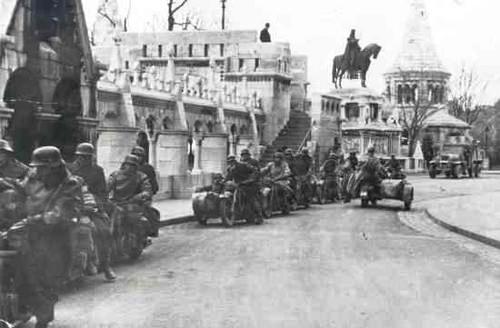
.jpg)
